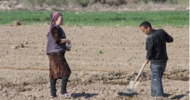"We decided to update a previous feasibility study due to the fact that the prices of food items that will potentially be grown on the project's lands, including fodder and grains, have changed drastically over the past year," Jordan's Agriculture Ministry Secretary General Radhi Tarawneh said
- Jordan Times
-
16 November 2009
“Governments are sitting on a box of dynamite,” Namanga Ngoni, president of AGRA, initiated by former UN Secretary-General Kofi Annan, told the media.
- Modern Ghana
-
11 November 2009
No deal was ever secured with Qatar, and China is now being eyed as a more appropriate suitor for the project.
The problem is that we will lose control. Of course, some regulatory framework will be put in place, but it will also include ceding of control over our land resource to foreigners for a yet-to-be-specified time period.
- Business Recorder
-
10 September 2009
The consensus is that Africa is being out-gunned. While regulations & rules are debated, the amount of land being bought up by foreign investors is increasing at a rapacious speed.
- Deutsche Welle
-
13 August 2009
It is essential that governments and international agencies act now to create not only a uniform code of conduct guiding foreign land acquisitions, but also an enforcement mechanism.
- World Politics Review
-
05 August 2009
The $1bn project, dubbed 7X7, aims at developing 700,000 ha of farmland to produce within 7 years 7 million tonnes of rice in Mali, Senegal and maybe Sudan and Uganda.
If the host state and foreign investors act in conformity with these suggestions, they will maximise the prospects that any large-scale land transaction benefits all stakeholders and minimise the chances of concluding harmful deals.
I wonder how many other behind-the-scenes transactions are currently underway in the continent that will only be announced when the deals have been signed and perhaps money has exchanged hands.
The boom in the acquisition of arable land in Africa by foreign companies and governments has stirred an international debate between international institutions such as the United Nations’ Food and Agriculture Organisation (FAO) and non-governmental groups and independent experts.
Codes of conduct don’t work, said Devinder Sharma of Forum for Biotechnology and Food Security, Delhi. “It is unethical to grab land in other countries; it will lead to food crisis as investor countries will grow food for profit.”
- Down to Earth
-
17 June 2009
The Qatari land deal in Kenya’s Tana River Delta has been seized upon by locals who have promised to fight it – to the death, if it comes to that.
- The National
-
05 June 2009
These arrangements are reminiscent of “banana republics” when many African countries served as plantations for European countries -- but even those did not come with such explicit restrictions and rigidities.
- Business Day
-
01 June 2009
After years of competing for overseas oil and mines, India and China are silently scouring the world for their next great need: farmland to grow food.
- Hindustan Times
-
04 May 2009
African states have actively encouraged Gulf investors into areas like agriculture, seeing them as a useful counterweight to China’s influence.
Planning these investments was carried out according to the following agricultural investment principles and criteria...
- Saudi Arabia Ministry of Foreign Affairs
-
26 January 2009
King Abdullah received today Saudi Arabia's Minister of Commerce and Industry accompanied by two Saudi businessmen Mohammad Hussein Al-Amoudi and Abdullah Hassan Al-Masri on the occasion of the arrival of the earliest produce of their rice to the Kingdom.
- S.Arabia MoFA
-
25 January 2009
To lure investment dollars, the Sudan government has removed import duties on agricultural equipment being imported into the country.
- Farming UK
-
16 January 2009
A US businessman backed by former CIA and state department officials says he has secured a vast tract of fertile land in south Sudan from the family of a notorious warlord.
- Financial Times
-
09 January 2009
Dependence on oil imports may be influencing the Ethiopian government’s decision to lease farmland to Saudi Arabia
- Farm Radio Weekly
-
22 December 2008
Nomadic herders, rarely a priority for governments, are being dispossessed by bioethanol developments in Kenya, says Michael Taylor of the International Land Coalition (ILC), and they also depend on the “unused” land that Madagascar offered Daewoo.
- New Scientist
-
04 December 2008
Soaring food prices, supply fears among import-dependent countries and rising demand for biofuels have driven up investment in agricultural land, notably in Africa.
Alarmed by exporting countries’ trade restrictions, importing countries have realised that their dependence on the international food market makes them vulnerable not only to an abrupt surge in prices but, more crucially, to an interruption in supplies.
- Financial Times
-
19 August 2008
The race by food-importing countries to secure farmland overseas to improve their food security risks creating a “neo-colonial” system, the United Nations’ top agriculture official, Jacques Diouf, has cautioned.
- Financial Times
-
18 August 2008
National elites and foreign investors in Africa will be protected by the AfCFTA. But the same cannot be said for local communities and their rights over agricultural land. In the name of climate, the AfCFTA will boost the development of land deals for carbon in Africa.
The transferability of land, along with the liberalisation of agriculture and finance the Bank and IMF have pushed on Global South states, have facilitated investment in agribusiness and driven the financialisation of national agricultural sectors.
- Bretton Woods Project
-
09 April 2024
With 56 deals under its belt, the UAE has 14 more farmland acquisition deals in the pipeline in 2024, mainly in Africa
With vast lands conducive to tree growth, Kirchmayer and ASC Impact believe that Africa is ripe for reforestation initiatives that support mass timber production and other green projects.
Tanzania is offering more than 60,000 hectares of fertile land to both foreign and domestic companies to invest in large-scale farming at Mkulazi area in Morogoro.
Tensions are bubbling up at Arizona alfalfa farms as water becomes a top commodity. Local farmers say that their wells have dried up since since an Emirati alfalfa farm moved in.















